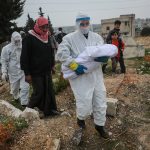Nine months into the outbreak of the COVID-19 pandemic, Syria’s public health conditions continue to worsen by the day. The Syrian government has been heavily criticized for its inadequate response to the spread of the disease and for suppressing information regarding the COVID-19 infection rate. After President Bashar al-Assad’s nine-year targeted assault on medical workers and health care facilities, the country’s already-strained public health system is being further crippled by the heavy demands of the coronavirus.
As of December 23, the Syrian government had officially confirmed only 10,442 cases of COVID-19 and 630 deaths in the territories it controls. Government reports released in October indicated that a total of 239 health care workers had tested positive for the virus, with only 15 deaths. However, the Syrian Medical Association reported 61 health care workers’ deaths in just the month of August, suggesting that the government is significantly downplaying the severity of the situation.
Instead of enacting aggressive public health measures, the government has instead focused its efforts on silencing medical professionals about the true toll of the virus.
Indeed, despite official numbers suggesting that Syria is doing well – the best in the Middle East – Syria has systematically failed to implement adequate preventative measures, protect its health care workers with medical supplies and personal protective equipment (PPE), and test large numbers of people for COVID-19. But instead of enacting aggressive public health measures, the government has instead focused its efforts on silencing medical professionals about the true toll of the virus.
Syria’s Case Number Reality
Recent documentation highlights the alarming state of Syria’s underlying public health conditions. While WHO representatives in Syria praise the country’s response to the pandemic, burial sites in Damascus are struggling to cope with huge surges in COVID-19 victims and mass graves are being built to bury hundreds each day. A recent study conducted by Imperial College London estimates that only about 1.25 percent of the actual COVID-19 deaths in Damascus are being counted.
Such major undercounting in Damascus, the province that is likely to have the most robust surveillance system in all of Syria, indicates that other regions, especially non-government held or “reconciled” territories – which were formerly under opposition control but engaged in a reconciliation agreement with the Syrian government – are suffering similar or worse mortality rates. A report from Physicians for Human Rights (PHR) reveals the systemic discrimination against and apparently purposeful neglect of Daraa governorate, in southwestern Syria. Health professionals and facilities in this reconciled province largely lack PPE, COVID-19 testing kits, and medical equipment needed to monitor and treat severe cases. Checkpoints between Daraa and Damascus restrict medical access to facilities with functioning beds and ventilators. In addition, authorities have blocked humanitarian assistance from reaching the province, further worsening the conditions of its deficient health system.
Silencing of Health Care Workers
To ensure the government’s success in denying the spread of the virus, Syrian medical professionals have had to perform their duties under the watchful eyes of security forces in state-run hospitals. A Middle East Institute report cites a Syrian physician reporting that, back in March, government’s security forces tightened their hold on hospital facilities. They instructed physicians to downplay the prevalence of the virus and falsely attribute COVID-19 deaths to pneumonia. The government designated special teams to deal with COVID-19 patients in hospitals, composed of doctors they trusted would keep silent about the dire conditions. Other physicians were not allowed to come in contact with the COVID patients, enter their wards, or access their medical information.
Because of the tense political climate around coronavirus in the country, Syria’s doctors live in constant fear of publicly addressing the problems they are witnessing. Those who speak out put their lives on the line. Dr. Emad Taher was killed just days after voicing concerns over the government’s poor COVID-19 response. PHR’s report highlights the high-profile case of the University of Damascus’s dean of medicine, who was fired after he publicly disagreed with the government’s policy to reopen schools. This form of persecution and intimidation hinders physicians from sharing potentially life-saving information about the virus’s prevalence, modes of propagation, prevention, and treatment. The reckless and securitized approach the Syrian government has taken to address the global pandemic has had grave consequences for the country’s ability to cope and effectively save the lives of thousands of its citizens.
Meaningful attempts to improve Syria’s dismantled health care system must be undertaken in order to enable its population to overcome the devastating toll of the COVID-19 pandemic. This calls for a collective effort from both local and international bodies. The United Nations, global governments, and humanitarian actors must urge the Syrian government and Ministry of Health to exercise transparency and report COVID-19-related data in order to accurately assess the virus’s impact and the populations’ health needs. The Syrian government must exercise greater urgency in designating an effective response to the pandemic and it must abandon discriminatory practices in resource allocation that are often imposed on reconciled territories like Daraa. In its efforts to defeat the coronavirus, Syrian leadership must embrace the counsel and criticisms of its health care workers and benefit from their professional expertise.
Only a coordinated, coherent response that relies on skilled professionals, protected and supported by the government without discrimination, can help Syria overcome such a tremendous crisis.

